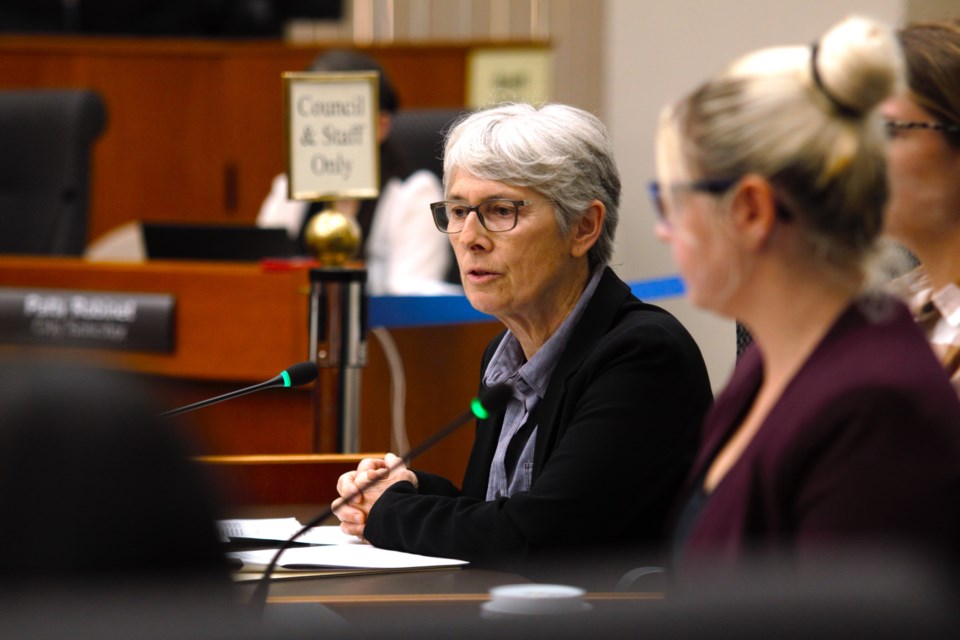THUNDER BAY — Thunder Bay’s city council has voted unanimously to declare intimate partner violence an epidemic, responding to sobering statistics presented by local women’s groups.
The move responds to a recommendation from the 2022 Renfrew County coroner’s inquest into the deaths of three women, Carol Culleton, Anastasia Kuzyk and Nathalie Warmerdam, at the hands of a former partner.
On Monday, representatives of the Thunder Bay District Coordinating Committee to End Woman Abuse and the Naadmaagewin Indigenous Domestic Violence Committee — umbrella groups bringing together dozens of local organizations from women’s shelters to victim services and police — called on council to make the declaration.
They noted nearly 50 other Ontario municipalities, including some in Northwestern Ontario, have already taken the step, calling it a symbolic act that would validate survivors of violence and could lead to further action.
Gwen O’Reilly, executive director of the Northwestern Ontario Women's Centre, told council the resolution has particular urgency in Thunder Bay, where rates of intimate partner violence are typically around twice the Ontario average and 1.5 times the national average.
She also called attention to the fact that Indigenous women are six times more likely to be the victims of intimate partner violence, calling tackling the problem “an act of reconciliation.”
Citing city police data, presenters indicated Thunder Bay’s rate of female victims of intimate partner violence had risen from under 700 per 100,000 people in 2019, to 867 in 2021 — more than double the provincial average.
In 2022, the Thunder Bay Police Service tracked 2,300 reportable intimate partner violence incidents, placing 703 charges. Around 86 per cent of victims in the cases were women.
Presenters and city staff said the data presented likely doesn’t capture the full scope of the issue, since intimate partner violence is “chronically underreported.”
The groups called intimate partner violence a worsening epidemic, pointing to national rates of police-reported intimate partner violence that have risen for seven consecutive years and recent spikes in local data, saying that was fuelled in part by the COVID-19 pandemic.
Presenters also drew attention to what they called vastly inadequate local resources to support victims of violence.
Maya Mounayer, of Beendigen, said the organization had to turn away nearly 600 women seeking support in 2022, a figure that roughly doubled form the previous year.
“Sometimes, we’re their last option, and there’s nowhere else for them to go,” she said. “Unfortunately, sometimes their [only option] is on the street, it is tent city, it’s staying at their unsafe uncle’s [or] friend’s house.”
O’Reilly added that some local services, like Thunder Bay’s sexual abuse centre, have closed, widening gaps in the system.
City councillors called the groups’ presentation “eye-opening,” “shocking,” “illuminating,” and “enlightening.”
Asked what declaring an epidemic would accomplish, O’Reilly called it a symbolic step that could be followed with further action.
“I think it sets this up as a priority issue,” she said. “Secondly, it puts pressure on the provincial government, which of course holds many purse strings in this area.”
Several councillors argued the city should go further than a symbolic declaration.
“If we’re declaring an epidemic here, I’m interested in follow-up,” said Coun. Brian Hamilton. “I just want to make sure we’re continuing to look at this and monitor this.”
Asked what more could be done, O’Reilly said the city could advocate to the province to make a declaration of its own and take the Renfrew County inquest recommendations more seriously.
“Their response to the inquest recommendations was a little lacklustre – they re-announced money that had already been committed, and they did not announce any significant changes in policy. So I think it’s important to put pressure on the province to follow through.”
She also pointed to safe, affordable housing, including housing dedicated to women fleeing intimate partner violence, as a key policy response.
Staff indicated rates of intimate partner violence would be tracked in annual community safety and wellbeing reports, while several councillors said they would initiate conversations with the District of Thunder Bay Social Services Administration Board on housing availability for victims.



.png;w=120;h=80;mode=crop)

.png;w=120;h=80;mode=crop)